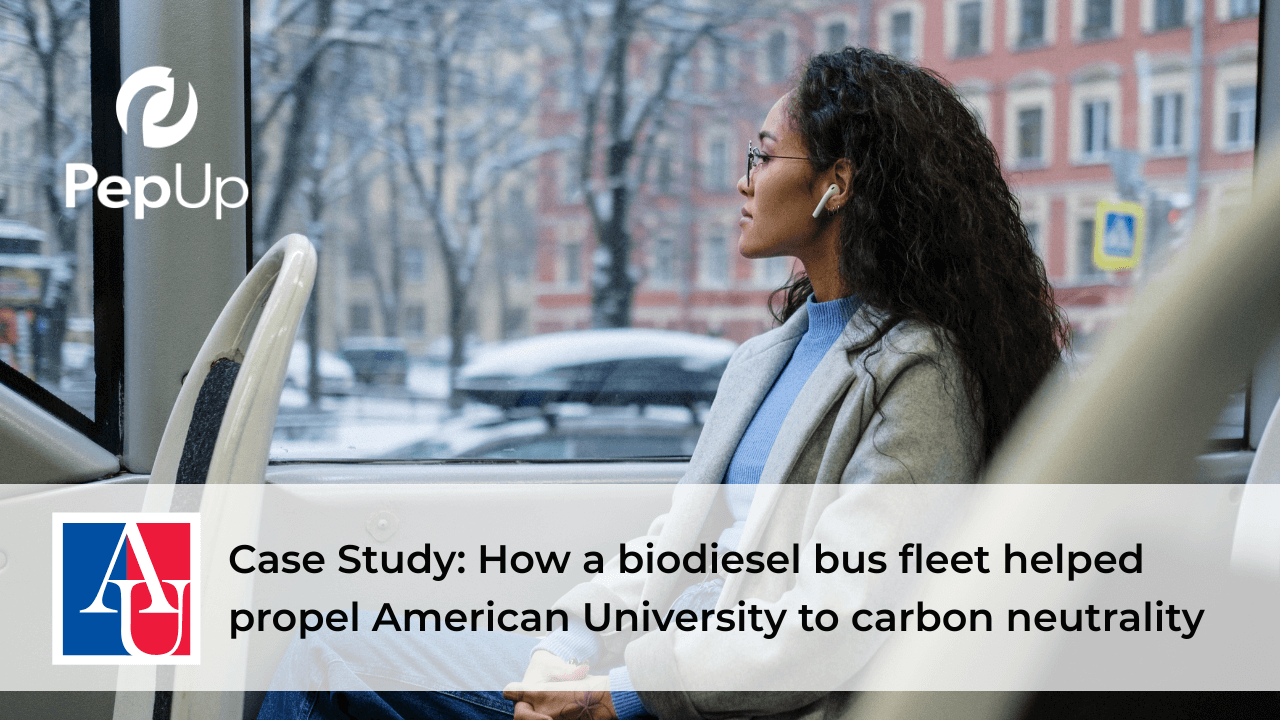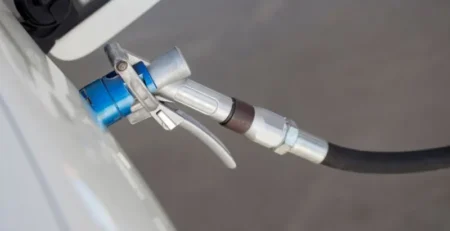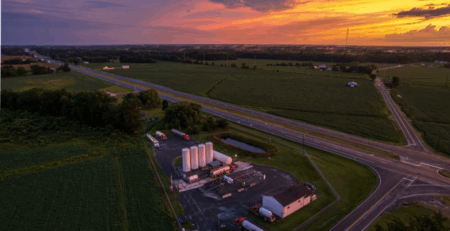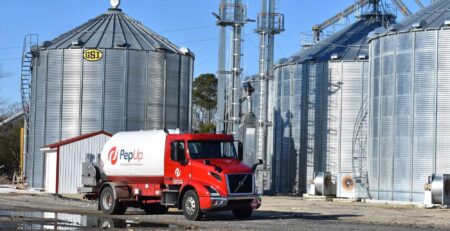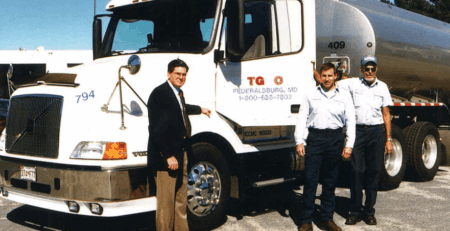How biodiesel helps American University reduce emissions
What if your campus shuttle could run on renewable biodiesel fuel without replacing a single engine? American University did just that—and reached carbon neutrality in the process, a full two years ahead of schedule.
Jump ahead to:
- American University net zero pledge: Background and results
- How PepUp helped fuel AU’s biodiesel bus fleet transition
- Dedicated PepUp AU Account Manager speaks to feasibility, cost savings of biofuels
- Biodiesel fleet impact on larger AU Net Zero goals
- PepUp’s commitment to fleet fuels, sustainability partnerships
AU identifies emissions challenges, achieves goals with biodiesel fleet transition
American University is nationally recognized for its commitment to sustainability, achieving carbon neutrality in 2018 and setting ambitious goals for zero waste by 2030. As part of the university’s sustainable action plan, researchers identified that 39% of all of the university’s greenhouse gas emissions were attributable to transportation.
By identifying top sources of greenhouse gas emissions and setting aggressive targets for reduction, AU achieved a 30 percent gross reduction in emissions in 19 years, reducing net greenhouse gas emissions by 109 percent with offsets.
A key part of achieving carbon neutrality was a project to transition a portion of the campus bus fleet to biodiesel, a renewable alternative to traditional diesel fuel. This move significantly reduced American University’s carbon footprint and set a model for sustainable campus operations. To tackle such a large initiative, the AU fleet management team chose PepUp as the university’s trusted fuel supplier.
A reliable partnership for cleaner fleet fuel
American University’s journey toward a greener fleet began in 2000, when it started using biodiesel in its shuttle buses. As the university’s needs grew, it turned to PepUp for dependable fuel delivery, storage, and quality assurance.
Today, select university shuttle buses run on biodiesel blends, with the fuel blend adjusted seasonally: B5 (5% biodiesel) in winter and B20 (20% biodiesel) in summer. This fueling plan, developed by AU’s fleet manager and the university’s PepUp account manager, ensures optimal performance in all weather conditions.
PepUp’s infrastructure has been essential to the success of AU’s journey to lower-emissions transit. While American University has a 1,000-gallon on-site tank, PepUp’s large-scale storage in Baltimore and dedicated bulk fuel delivery fleet ensures a steady fuel supply even when demand spikes.
Dedicated PepUp account manager directly supports AU fleet needs
Fuel quality and reliable delivery are critical to the success of any biodiesel program. PepUp is committed to providing high-quality biodiesel that meets strict industry standards.
PepUp Account Manager Seth Powell has managed American University’s fleet fuel account for more than 15 years, and he understands the fleet’s needs and American University’s sustainability goals. Powell works closely with American University’s fleet manager to recommend the right biodiesel blends and advise on best practices for storage and use, especially during cold weather.
Powell says AU’s eco-friendly fleet transition project proves biofuels can make fleet operations more sustainable and environmentally friendly.
“It’s absolutely a viable option,” Powell explained, citing other education and municipal transportation fleets that made a similar transition when federal incentives made biodiesel more affordable. “It’s a renewable resource, but it is more expensive. The reality is that the push to move away from fossil fuels completely (and move to electric vehicles) isn’t a viable option, but biodiesel is the bridge fuel that can be used in existing fleets, sometimes without modification.”
“EVs aren’t going to solve everything. There’s still going to be a need for diesel, and you can use biodiesel up to B20 in most diesel engines without issue. It comes down to education and people realizing that it’s a viable option.”
Seth Powell, PepUp Account Manager for American University
Powell’s relationship with the AU fleet manager means American University continues to receive expert guidance from PepUp, from choosing the right blend to troubleshooting any operational questions. PepUp’s experience with other large institutional fleets ensures that AU benefits from proven solutions and lessons learned across the region.
Biodiesel fleet results and impact
- Reduced Emissions: Switching to biodiesel has cut greenhouse gas emissions from campus buses, supporting American University’s net-zero goals. See the results in this public reporting dashboard.
- Operational Efficiency: On-site fueling and scheduled bulk deliveries have streamlined operations and reduced costs.
- No Major Modifications: American University’s existing diesel buses required no significant changes to run on biodiesel blends, making the transition smooth and cost-effective.
- Education and Buy-In: Success depended on buy-in from all university stakeholders. Ongoing education and clear communication helped address early misconceptions about biodiesel and built strong support among staff and students.
Looking ahead: Sustainable fleet management, fueled by PepUp
American University’s experience shows that biodiesel is a practical, reliable bridge fuel as institutions work toward greener transportation. The partnership with PepUp demonstrates how the right supplier can make a big difference – not just by delivering fuel, but also by supporting every step of the journey to sustainability.
Want to make your fleet more sustainable—without overhauling your vehicles? See how PepUp can help you fuel smarter, cleaner, and more reliably. Speak with a PepUp Energy Specialist, who will connect you with a fleet fuels account manager to discuss your fleet needs.
Explore how PepUp supports fleets of all types and sizes with the knowledge and infrastructure to provide reliable fleet fuel delivery of up to 7,500 gallons of fuel, as often as twice weekly.

